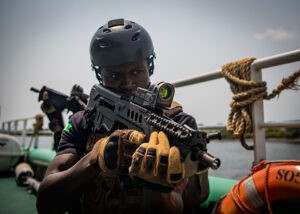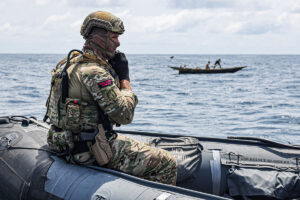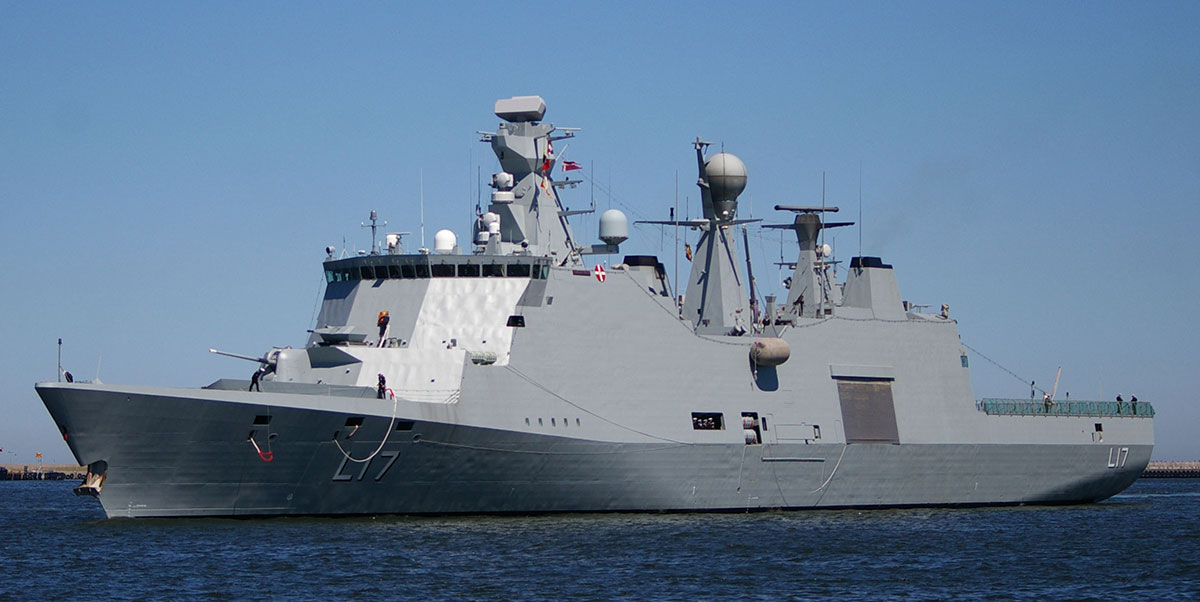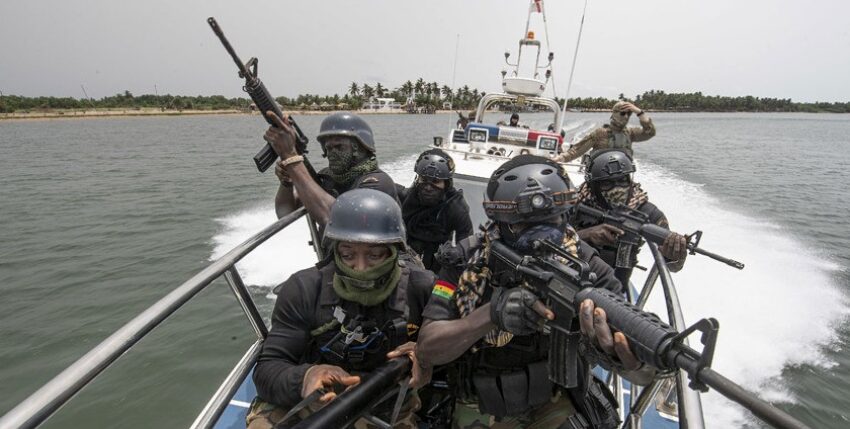Far-reaching measures are needed to permanently free sea areas such as the Gulf of Guinea from the threat of piracy. The concept of maritime security sector reform with the establishment of sustainable security governance promises success.
Piracy is still often associated with pirates from films and television sailing under the banner of Jolly Rogers. However, the threat of piracy and armed robbery is still a real risk to shipping and maritime safety in the 21st century. According to Article 101 of the United Nations Convention on the Law of the Sea (UNCLOS), such piracy includes "(a) any unlawful act of violence or deprivation of liberty or any act of plunder committed by the crew or passengers of a private vessel [...] for private ends and directed i) on the high seas against another vessel [...] or against persons or property on board such vessel [...]" or "(ii) in a place not under the jurisdiction of any State [...]." According to the International Maritime Organisation (IMO), armed robbery includes any unlawful act of violence, detention and plunder, or threat thereof, committed privately and carried out against persons or property on board a ship in internal or territorial waters.
In fact Piracy The effects of the crisis often extend beyond the actual act itself: for example, for shipping companies and the shipping industries, regional economies and security or even global supply chains. In the early 2000s, the Piracy The Horn of Africa has attracted global attention due to its trans-regional impact on trade, shipping and supply chains and could only be contained through international co-operation, in particular through the deployment of naval forces.

In recent years, however, the Gulf of Guinea has stood out due to a growing number of cases of Piracy and armed robbery. In 2020, for example, 95 per cent of all listed hostage-takings of ship crews took place in the Gulf of Guinea. This also attracted international attention due to the impact on shipping traffic. As a result, the Danish and French naval forces, for example, deployed units to the region to support local security forces in anti-piracy measures and other maritime security challenges - with success. For the year 2022, the International Maritime Bureau (IMB) registered exactly two hostage-takings and three Piracy incidents in the Gulf of Guinea.
However, focussing on such figures leads to a misconception. Because Piracy is just one of many methods of income generation, often caused by social hardship. It is sometimes brought to the fore by external actors as a problem of maritime security, for example to prioritise the protection of trade. At the same time Piracy and robbery are just two of many different maritime security risks. These also include illegal fishing and the smuggling of drugs and weapons. For this reason, maritime security cannot be exclusively linked to high-profile numbers of cases of Piracy The problem of the Gulf of Guinea is particularly evident when, as in the case of the Gulf of Guinea, the number of registered cases is high. This problem becomes particularly clear when, as in the case of the Gulf of Guinea, the number of registered cases of Piracy and robbery is decreasing significantly. For this reason, this article takes the approach of promoting maritime security as part of the concept of Maritime Security Sector Reform (MSSR) in order to be able to respond to the many challenges in the long term and sustainably.
Maritime security in the 21st century
Maritime security has gained increasing attention since the early 2000s due to the exponential increase in international shipping and goods traffic as part of the globalisation process. Christian Bueger describes maritime security as an "umbrella term". With his four-fold matrix, however, he identifies four key areas (domains) of maritime security. These four key domains are national security, the marine environment, economic development and human security. According to the authors, these domains are strongly interlinked and influence each other. If one follows a comprehensive and non-traditional understanding of security, Bueger's concept inevitably leads to the comprehensive security approach of security sector reform (SSR).
The concept of security sector reform has become increasingly important in international development aid, political circles and academia since the late 1990s. SSR emerged from a combination of considerations on traditional security assistance and development policy with academic studies on civil-military relations.
The end of the Cold War in the early 1990s in particular revealed the problematic effects of traditional security assistance programmes and the lack of sustainable structures for democratically legitimised control of the security sectors in countless transition states, for example in the former Warsaw Pact states. In order to prevent abuse of the potential for violence in the respective national security sectors and to ensure democratically legitimised control, SSR programmes were initiated to achieve comprehensive national institutional reforms, the establishment of legitimate civilian supervisory bodies and a restructuring of the respective security sectors.
SSR involves the establishment of sustainable security governance that is underpinned by democratic norms and principles, legitimate civilian oversight and transparent and accountable procedures. One of the most important steps in the reform process is the creation of a supervisory function by legitimate civilian representatives over the most important institutions of the respective national security sector. As a rule, these are the line ministries of a state, such as the ministries of the interior, justice, defence, foreign affairs and finance, as well as the relevant parliamentary committees and oversight bodies.
While the reforms are initiated at the ministerial level, a second level focuses on the respective actors with executive powers, such as the police, military, intelligence services and pending institutions. In addition to a revision of the respective doctrines and laws, a key focus is on the establishment of internal control mechanisms within the respective institution to ensure transparent, accountable and sustainable self-regulation and to prevent misconduct and abuse of authority towards civilians. As SSR measures go beyond purely technical (security) assistance and target one of the most sensitive areas of national sovereignty - control over the state's monopoly on the use of force - SSR is primarily political in nature.

SSR paradigm
The concept of Maritime Security Sector Reform (MSSR) is still in its early stages. Due to the growing importance of maritime security, the idea of MSSR is also attracting increasing attention in politics and research.
Fragile states and poor governance favour the spread of piracy, smuggling and illegal fishing. Weak statehood and a lack of effective governance have created areas with little or no state control. These extralegal territories in particular can serve as a retreat and base of operations for organised crime and armed groups that engage in piracy, for example. The containment of piracy and maritime insecurity therefore requires a comprehensive approach to the problem of weak statehood in the respective neighbouring states.
As MSSR is part of the SSR paradigm, the focus of MSSR is on the goal of strengthening the overall governance capacity of the respective neighbouring states. Although this should be a whole-of-government approach, special attention must be paid to the internal and external security, economic, financial and judicial authorities due to overlapping responsibilities. One of the most important measures is the development or revision of relevant codes and protocols in the field of maritime security and maritime law in order to create a solid working basis for the respective national executive forces. In addition to institutional strengthening, traditional capacity building measures, such as the provision of equipment and training capacity, are necessary to ensure that law enforcement forces are able to intervene and protect maritime traffic when necessary.
Traditional security assistance often focusses on building and expanding the capacities and capabilities of the respective security forces. However, this is not a sustainable approach that strengthens the governance of the respective states in the areas mentioned. In contrast to traditional security assistance, which usually only follows one- or two-dimensional security concepts, (M)SSR is a holistic concept that encompasses all aspects of governance. Precisely because (M)SSR pursues this holistic approach, a key principle of SSR is the comprehensive involvement of relevant state and non-state actors in order to create a permanent interdisciplinary and interdepartmental dialogue. The reform of the (maritime) security sector of a particular country or region can be supported by external actors such as the United Nations or ECOWAS. However, it is up to the respective local actors to implement and continue the agreed measures in line with the principle of local ownership.
Success through safety assistance
The case of piracy in the Horn of Africa remains the most topical reference point for modern Piracy. After the peak of the attacks in the early 2000s, the pooling of international forces and the corresponding deployment of their naval forces on the ground Piracy and protected the neighbouring sea lines of communication (SLOC). Due to the influence of the Piracy The measures could not only be introduced extremely quickly, but also led to a rare unity in the United Nations Security Council, for example through the adoption of Resolution 1816. The measures were implemented through international anti-piracy operations such as NATO's Operation Ocean Shield (2009-2016) or the European Union Naval Force (EU Navfor) Somalia - Operation Atalanta (since 2008), as well as Combined Task Force 151 (CTF-151, since 2009), in which ships from Brazil, Japan and Pakistan have also been involved. The resulting naval presence and the interventions and active measures to combat piracy, flanked by the training of crews in emergency measures in the event of pirate attacks and the embarkation of armed private security companies, have rapidly reduced piracy and armed robbery.
From a Western and European perspective, the operations were largely successful. Dirk Siebels, for example, emphasises the unprecedented cooperation between naval forces and the shipping industry for the success. As a result, piracy in the Horn of Africa was pushed back and the neighbouring SLOCs remained freely passable. Nevertheless, it should be noted that this success remains limited to the symptoms of various causes in and around the failed state of Somalia. In addition to decades of illegal and unregulated fishing by entire fleets of foreign fishing boats off the Somali coast, the associated unemployment of regional fishermen and local corruption are considered to be the catalysts of piracy in the region.

Stabilisation approach
A comprehensive approach such as the MSSR is required to combat more than just the symptoms of poor living conditions, weak governance and a lack of (maritime) security through security assistance and naval operations. Only in this way can maritime security in the Gulf of Guinea be stabilised in the long term and sustainably. Accordingly, MSSR aims to involve all participating states in the region as dialogue and cooperation partners, for whom piracy is just one security problem among many.
Externally driven initiatives as part of an MSSR approach in the Gulf of Guinea must therefore be designed in two ways. Firstly, the consent of and cooperation with regional stakeholders is crucial. Therefore, initiatives should address and build on existing formats of the littoral states such as the multinational Yaoundé Process, the Nigerian Deep Blue Project or activities related to Ghana's National Integrated Maritime Strategy. The Policy Framework on Security Sector Reform of the African Union (AU) should be considered in particular. In addition, the initiatives should include efforts that go beyond mere security assistance to include regional economic communities, not duplicate existing structures and not ignore newly created structures. Secondly, they should also promote international co-operation within the region, for example in the existing declaration to combat piracy in the Gulf of Guinea, to reduce the risk of complications and disputes following co-operation efforts. A comprehensive, multinational maritime surveillance system to increase maritime domain awareness should be the goal of a co-operative approach to regional maritime security.
PiracyArmed robberies and smuggling are not limited by maritime borders. Solutions to combat them should therefore be found through increased regional and supra-regional co-operation. External actors such as the European Union and its national naval forces could support affected states in the Gulf of Guinea in the coordination of maritime military operations and through training measures. It should be noted, however, that training measures alone are not sufficient to combat maritime insecurities such as piracy, marine pollution, illegal fishing or smuggling in a long-term and sustainable manner. It is true that security assistance, as in the Horn of Africa, can provide short-term relief in the event of acute challenges and a lack of state points of contact. However, a whole-of-government approach by the respective neighbouring states is required in order to achieve sustainable success in combating maritime insecurity. By pursuing a (M)SSR approach in the respective coastal states, gradual changes in good governance will ideally occur. One of the greatest challenges in combating maritime insecurity in the Gulf of Guinea is therefore not only to actively combat PiracyThe main challenge lies in the implementation of sustainable political reforms and practical realisation against the backdrop of African ownership in the respective riparian states. These can be supported externally, but must ultimately be implemented regionally by the neighbouring states.
Deniz Kocak and Julian Pawlak are research assistants at the Helmut Schmidt University/University of the Federal Armed Forces Hamburg and part of the interdisciplinary research focus Maritime Security (iFMS) based there.
Deniz Kocak and Julian Pawlak








